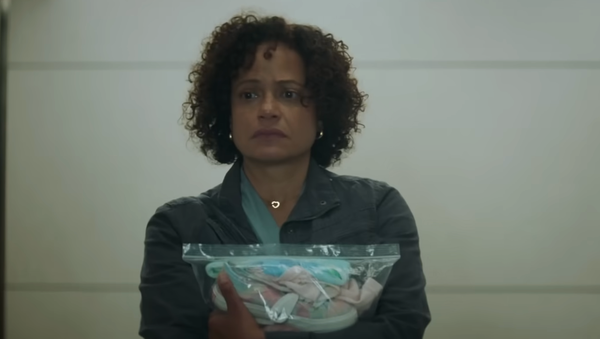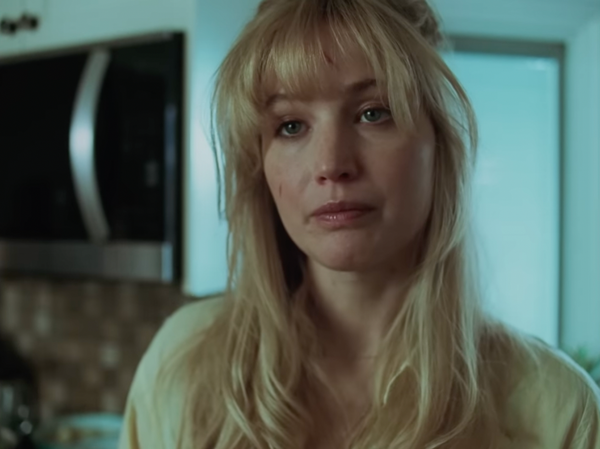Oscar O’Sullivan breaks open Yorgos Lanthimos's captivity classic Dogtooth, available to rent now from IFI@home.
What’s in a word?
A simple sequence of sounds, used to describe something real or imagined. We hear a word and its accompanying image comes to our mind unbidden. But consider this: a word only has meaning because we are all in agreement on that meaning. So imagine meeting someone who speaks the very same language you do, but thinks a zombie is a type of flower, or a telephone is a salt shaker. This linguistic absurdity is central to Dogtooth, a film about how our perception doesn’t just affect our reality – it is our reality.
Released in 2009 to wide acclaim and an Oscar nod for Best Foreign Language Film as Greece’s offering, Dogtooth is the launchpad that propelled Greek director Yorgos Lanthimos (The Lobster, The Favourite) into the mainstream. Well, as mainstream as this style of stark, unsettling cinema can get. For example, Poor Things, one of the most aggressively bizarre films of the decade so far, earned back more than triple its budget and picked up four Oscars. His celebrated collaboration with Emma Stone continues this year with kidnapping thriller Bugonia, so in the spirit of anticipation, I've cast my eye back to his pre-Hollywood breakout.
Set in a large, fenced-off family home, Dogtooth follows the lives of three adult children (nameless characters played by Hristos Passalis, Angeliki Papoulia and Mary Tsoni) who (as far as can be made out) have never seen the outside world. I use the oxymoron of 'adult children' because it best describes the strange state of being the siblings exist in. Isolated and unsocialised, they rely entirely on their parents to provide, from food and shelter to education. In the opening scene, they are 'gifted' with knowledge of four new words – sea, highway, road trip and shotgun. These words are respectively explained to mean a chair, a strong wind, a durable material and a type of bird. It is silly, yes, and much comedy comes from the oblivious stupidity of the siblings' everyday conversations. Look a little deeper, and there is a method to the seeming randomness of what the siblings do and do not know – nearly all of the words they misunderstand are to do with travel, escape and the outside world. Just as in George Orwell's 1984, language is power – how can a person rebel when they don’t even have the capacity to describe rebellion?
Yorgos and his co-writer Efthymis Filippou never elaborate on the ultimate goal of this experiment, focusing on the methods. Father (Christos Stergioglou) and Mother (Michele Valley) are technically equals at the top of the hierarchy, but the system remains as patriarchal as any other. Father is the only person allowed to leave the compound to brave the dangers of the outside world, returning with vital supplies and news of dangerous predatory cats who have eaten their unseen (imaginary?) brother. In reality, he goes to work and runs a factory of indeterminate purpose. His employees believe his wife is an invalid who abhors company. In many ways, she’s as much a prisoner as the children, though the film never lingers on her situation for long. Brief hints of alcoholism and a growing distance between her and her offspring are enough to fill in the blanks – maybe she did take a more active role in raising them when they were actually children. Now they seem to spend their days essentially unsupervised, learning from pre-recorded tapes, while Mummy sits in her room and waits for the only person she has in her life to come home, a warped exaggeration of the classic nuclear family.
What’s important is that the family has a convenient excuse to shun all visitors, save one. Christina, a security guard from the factory, is paid handsomely to visit once a week and perform intercourse with the son. It is a clinical, passionless act, an early indicator of how dehumanising this life has been for the unwilling participants. Introducing an outsider and briefly visiting the father’s factory confirms for the audience that the film very much takes place in the real world, pre-emptively cutting off any theorising about apocalyptic twists or fantastical settings beyond the confined reality of the family unit.
To circle back to the idea of claustrophobia, we need to take a look at the film's cinematography. We pass time in long, unbroken takes with no camera movement to speak of. This conveys the rigid, stale ennui that has settled over the lives of the lead characters. To help alleviate that claustrophobia for the audience, the house chosen for the film has spacious, high-ceilinged rooms and an enormous garden, allowing for movement and scope despite the limited setting. Close-ups are also used to great effect, often extreme and off-centre. Sometimes this has the effect of cutting off parts of the body, abstracting familiar human forms. On other occasions, we are invited to look past the characters and pay attention to the spaces and objects half-glimpsed beyond them.
Note also the lack of musical score, often a film's primary weapon in the war for emotional response. In their stunted half-lives, the children have no access to their emotional faculties, hence the absence of non-diegetic music. The few occasions where they are allowed to play music on a record feel like bursts of excitement, of real life seeping in through the cracks in their impregnable fence. They never last long.
Dogtooth is unsettling in the best possible way, a window into an upside-down world that may reveal some uncomfortable truths about our own perceptions of reality. The stark depictions of sex and nudity might be a little much for the prudish among us, and brief moments of brutal violence will have even hardened veterans of action films wincing. This hard edge is typical of European art cinema, and major international success has not softened Lanthimos’ bite one bit – last year’s Kinds of Kindness was divisive precisely because of its unflinching nastiness and inscrutable tone. Dogtooth is a far-from-flashy work, presented with a quiet confidence and a steady hand. Despite having no easy resolutions or grand closing statements, it’s a story that offers up its message willingly, without any trickery or diversion.
After all that, you may be wondering what the eye-catching title actually means. While the film offers up its own explanation, in the spirit of things, I have provided my own meaning. Dogtooth – an object that is both disturbing and intriguing at the same time. After all, what’s in a word?
Dogtooth is available to rent now through IFI@home.







